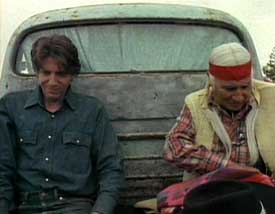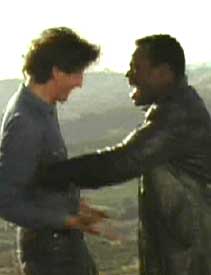Peter Coyote stars in Out (1982), retitled Deadly Drifter by its distributors so that someone might actually go see it. Neither title quite warns the viewer that it's a hippie-revolution stoner adventure.
At a time when hippies in the movies were portrayed as sociopaths or morons deeply feared by the adults in charge of what sort of pablum entertainment was permitted to be, it must have been heartwarming for those few who encountered Out & realized it was crazily connected to the actual youth culture of tune in, turn on, & drop Out.
 Danny Glover is also in it (his first film) & the video boxes this has been marketed in over the years just about always show older versions of Peter & Danny, looking like detectives or tough guys, to go with the retitle. Danny Glover is also in it (his first film) & the video boxes this has been marketed in over the years just about always show older versions of Peter & Danny, looking like detectives or tough guys, to go with the retitle.
There seems to be a marketing fear of the actual film, but no concern about disappointing customers who bought a cops or thugs package only to find themselves stuck with a mystic hippie adventure.
But anyone who remembers that era will enjoy the authenticity of Peter Coyote, who really was a hippie. The ideals of youth of the era expressed in terms of a satirical fantasy will either strike the viewer as too ridiculous to judge fairly, or will touch the heart with the dreamy naivete of a generation that once believed in dreams.
Based on the 1973 blank-verse novel Out by Ronald Sukenick, some of it was adapted into poetic film dialog that will either madden or delight. The screenplay was co-written by Sukenick himself, together with only-time director Eli Hollander, today a professor of filmmaking at the University of California, Santa Cruz.
Rex (Peter Coyote) was a Greenwich Village existentialist who passed through foolish stages of alienatation & ideality in the 1960s & 1970s. He had been an advocate of violent overthrow of the status quo, a believer in anarchy or communism or something vague & uncertain.
He has a new awakening probably no more or less idiotic than his former phases, & sets off on a road journey a la Jack Kerouac & achieves the mystic heights (or depths) of a Carlos Castaneda.
Hitchhiking, Rex meets a marvelous old coot of an Indian named Empty Fox (Grandfather Semu Haute, a non-actor who'd probably have become famous if he'd lived a little while longer for just a few more film roles). He's full of good humor & mystical claptrap, a codger who takes the art of being a wise old man as a seriously as any spoof can me, like a Zen master telling jokes that open the mind.
"Mr. Road says 'Stop here,'" says Empty Fox, who takes Rex into the woods & tells him to find a rock that is as sexy to him as a beautiful woman. Rex crawls around in the woods, pushing fallen leaves around with a stick, taking the fool's quest so seriously it's rather endearing to watch Peter Coyote playing the role with this degree of sincerity. And sure enough, he finds a really spectacular little rock & hugs it & loves it.
He afterward discovers he's alone in the woods but eventually Empty Fox comes down from the mountain & shares his "coyote tobacco" which he keeps in a Bit-of-Honey candy wrapper.
They get stoned together & become one. Rex has a vision of an enormous whale spirit & Empty Fox has to drag him forcibly out of his vision, listening to Rex tell a strange tale of Jonah & the Earthmother & the Whale while speaking exclusivel in in the Maidu Indian language which Rex couldn't possibly know, except for being One with Empty Fox.
Thereafter Rex has the power to heal by the laying on of hands. He wanders alone through the Nevada desert & though it's totally impossible, he stumbles upon his old friend Roland (Glover) from days of the pipedreams of Revolution. Their reunion is wry & very funny if you're open to such nutty half-serious humor & wordplay.
After curing Roland's broken foot by the laying on of hands, they continue together across the desert & come to a roadside cafe, where Roland immediately tries the one-armed bandits. "You can't win them all!" he said, losing his last lucky coin. "Yes you can," says Rex, who takes Roland over to where there are a bunch of cowboy hats to wear, & helps him pick out a lucky hat.
Thereafter, the one-armed bandit pays off, filling Roland's lucky cowboy hat with coins. But Rex's newfound powers haven't ended his alienation, & he soon has to part from Roland.
He heads off for Venice, California, "to have my eyes examined," as he's seeing lots of rainbows & halos & shadows. Venice was the next best thing to the Height Ashbury district of San Francisco for hippidom of the '70s, a good place for the meandering tale to find its conclusion.
In Venice he has more mystical experiences & learns from a bizarre optometrist (Jim Haynie) a bit more about his developing clairvoyance.
By the sea he again reconnects with Roland & with other past friends of the phony Revolution, including his old girlfriend Nixie (O-Lan Jones, at the time O-Lan Shepard), with whom he plays out the doomful vision of the whales, & no concidence Nixie is named for a water spirit.
Nothing about the film is definite enough to be completely satisfying & the mysteries are a mite too absurd to be enough to make the film especially successful. Although no excuse made for the production could seriously allege it's a good film, it would be a mistake to dismiss it as awful.
The majority of people couldn't possibly like it, no more than could the majority of people like an experimental novel in blank verse. But that doesn't mean it's bad, either. Viewed with an open mind & perahps a dash of nostalgia, this is an enjoyable piece of independent filmmaking, & even the close-minded might find the character of Empty Fox worth one's patience in viewing.
copyright © by Paghat the Ratgirl
|

 Danny Glover is also in it (his first film) & the video boxes this has been marketed in over the years just about always show older versions of Peter & Danny, looking like detectives or tough guys, to go with the retitle.
Danny Glover is also in it (his first film) & the video boxes this has been marketed in over the years just about always show older versions of Peter & Danny, looking like detectives or tough guys, to go with the retitle.